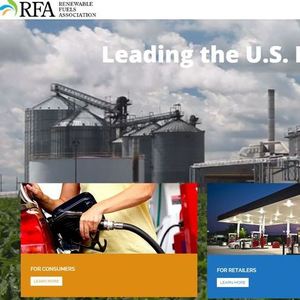RFA launches revamped website

PHOTO: RFA
October 6, 2015
BY RFA
The Renewable Fuels Association announced it has launched a completely redesigned website. With the completion of the full rebuild, RFA has added new and enhanced content to further improve ease of navigation, usability, and end-user experience. The website will provide up-to-date market data and will feature news of importance to the ethanol industry, as well as statistics, RFA reports and studies, and infographics. The website also features Google optimization and a responsive design that allows its display to be easily viewed of any mobile device, smartphone, laptop, or tablet.
“When we took on the task of redesigning the RFA website, our main goal was to greatly enhance the end-user experience,” said RFA President and CEO Bob Dinneen. “The functionality of the new website will make it a dynamic resource for those who are looking for the latest information on the ethanol industry. RFA will continue to vigorously advocate for policies that seek to provide a stable energy marketplace and allow consumers to have more choices at the pump; the new website is part of a set of tools, including the RFA mobile app, ‘RFA Advocacy,’ that will assist RFA in its efforts.”
For information on the RFA mobile app, visit: www.EthanolRFA.org/policy/app
Advertisement
Advertisement
Related Stories
The U.S. Energy Information Administration maintained its forecast for 2025 and 2026 biodiesel, renewable diesel and sustainable aviation fuel (SAF) production in its latest Short-Term Energy Outlook, released July 8.
XCF Global Inc. on July 10 shared its strategic plan to invest close to $1 billion in developing a network of SAF production facilities, expanding its U.S. footprint, and advancing its international growth strategy.
U.S. fuel ethanol capacity fell slightly in April, while biodiesel and renewable diesel capacity held steady, according to data released by the U.S. EIA on June 30. Feedstock consumption was down when compared to the previous month.
XCF Global Inc. on July 8 provided a production update on its flagship New Rise Reno facility, underscoring that the plant has successfully produced SAF, renewable diesel, and renewable naphtha during its initial ramp-up.
The USDA’s Risk Management Agency is implementing multiple changes to the Camelina pilot insurance program for the 2026 and succeeding crop years. The changes will expand coverage options and provide greater flexibility for producers.
Upcoming Events










